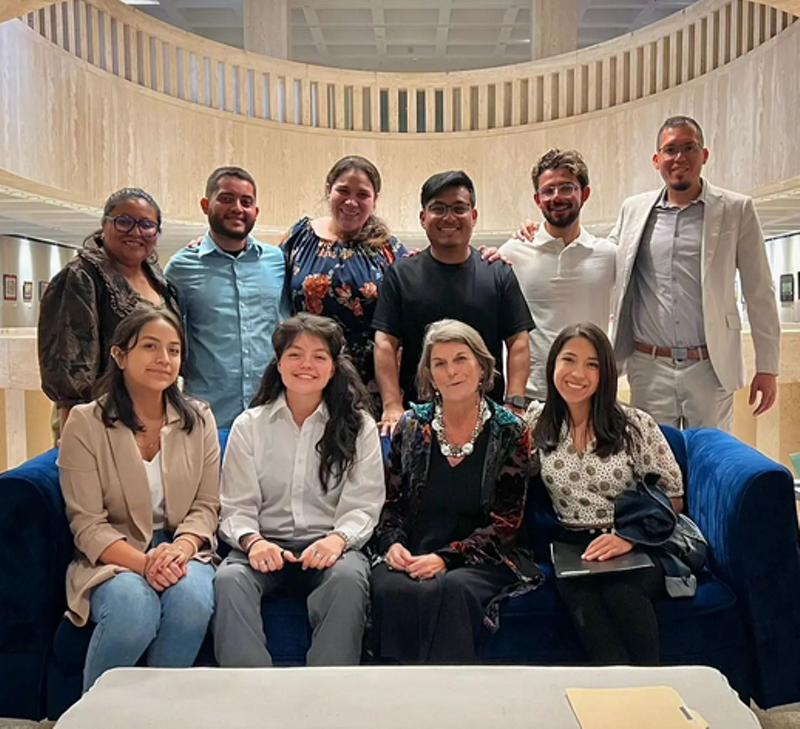Like many of Florida's more than 24,000 so-called Dreamers — people brought to the United States as undocumented minors and protected from deportation through Deferred Action for Childhood Arrivals (DACA) — Maria's earliest memories were made in the U.S.
She recalls going to the Frost Science Museum in Miami and being transfixed under the blue light of the ocean exhibit.
"I was just five years old when I looked up. I felt like I was out of this world but I knew this was my home," she says.
Maria grew up as a studious South Florida kid with a knack for math, graduating sixth in her class in high school before attending Miami Dade College. She says she transferred to Florida International University (FIU) on a scholarship to study mechanical engineering, a natural fit given her proficiency with numbers and passion for environmental sustainability. At age 24, she's finishing up her final semester at FIU and planning to pursue a master's degree.
Her path through college and towards a fruitful career was made possible in part by a law that provides for in-state tuition rates for undocumented immigrant students in Florida. Signed by then-Governor Rick Scott in 2014, the law ensures that undocumented Floridians attending public universities are not forced to pay out-of-state tuition rates, which are typically two to three times more expensive.
Thousands of students who reside in Florida were banking on the law to help provide them with an affordable education — until late February when Governor Ron DeSantis announced his intent to repeal the tuition protections.
"This will be just another obstacle in addition to all the others we face as a community, as Dreamers, as students, as immigrants, as people," Maria says.
DeSantis' proposal was part of a sweeping immigration law overhaul that, if passed, would prohibit local government from issuing ID cards to undocumented immigrants, require private companies to use the E-Verify platform to check employee work authorization, and mandate that hospitals amass immigration status data on patients, among other provisions.
"Florida is a law-and-order state, and we won't turn a blind eye to the dangers of Biden's border crisis. We will continue to take steps to protect Floridians from reckless federal open border policies," DeSantis said in announcing the package.
Maria and other students went to the Florida Capitol on March 7, the first day of the legislative session, to encourage state lawmakers to reject any provision to revoke in-state tuition for undocumented students. She fears that if the discounted tuition is taken away, countless undocumented Floridians will no longer be able to afford higher education.
"We're not here to take anything from anyone. We just want to give back to the community. We want to give back to our state and help in any way that we can," she says. "It's only fair that we have the same opportunity to pursue those things."We're not here to take anything from anyone.
tweet this
For reference, in-state resident tuition at FIU costs about $6,000 a year versus $18,000 for out-of-state residents. Under DeSantis' plan, undocumented students would be paying out-of-state tuition no matter how long they have lived in Florida and could be strapped with $48,000 more in tuition at FIU over a four-year period.
At a February news conference, DeSantis said "the costs have changed" for the state university system and that his proposal would help keep tuition low for those he called "our own people."
"We work really hard to make higher education affordable for Floridians, and we're proud of that. We have the most affordable higher education in the country," DeSantis said. "If we want to hold the line on tuition, then you've got to say, you need to be a U.S. citizen who lives in Florida. Why would we subsidize non-U.S. citizens when we want to make sure we can keep it affordable for our own people?"
Another FIU student, Aquiles, tells New Times he arrived in the U.S. from Caracas, Venezuela, when he was 11.Why would we subsidize non-U.S. citizens when we want to make sure we can keep it affordable for our own people?
tweet this
Living in Florida under Temporary Protected Status has allowed him to receive in-state tuition and pursue his interest in film editing and broadcast journalism — a passion that grew from disdain for the lack of press freedom in his home country.
The 21-year-old is a third-year student at FIU. After graduation, he says he'd love to get a job at Telemundo or Univision or work as a video editor, but fears DeSantis' proposal will jeopardize his ability to finish his studies and pursue a journalism career.
As it stands, undocumented students who reside in Florida can obtain an out-of-state tuition waiver if they attended a Florida high school for three consecutive years immediately prior to graduation and apply to college within two years of graduating. The tuition waiver only applies to undergraduate programs.
Immigrants make up roughly 21 percent of the population in Florida, and roughly 40,000 students who are enrolled in higher education in the state are considered undocumented.
While data is relatively scant on the economic contributions of undocumented residents, it's estimated that Florida's DACA recipients earned $3.6 billion in wages and contributed nearly $330 million to state and local taxes between 2013 and 2022.
DeSantis has garnered support for his immigration law overhaul among hardline conservatives, but a faction of Republicans is taking issue with the tuition proposal. Former Republican Party of Florida Chair Al Cardenas, one of several Republicans who worked behind the scenes with Scott on the 2014 bill, recently told the Florida Phoenix that the proposed law "makes no sense" from an economic and humanitarian standpoint.
"Why do we do that, other than to be mean-spirited? I don't know," he told the outlet.
When reached by New Times, DeSantis' press office referred back to his statement about rising costs in the Florida public college system and keeping tuition affordable "for our own people."












